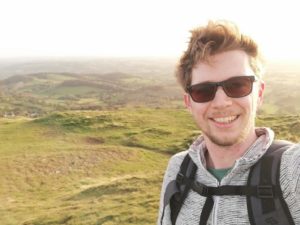Journeys to Humanism: Philosophical Wanderings

Journeys to Humanism, theHumanist.com’s regular series, features real stories from humanists in our community. From heartwarming narratives of growth, to more difficult journeys, our readers open up about their experiences coming to humanism.
Mike Jay
Kent, England
My name is Mike. I am a humanist.
However, I’d be lying if I denied that my journey to humanism has taken a loose and meandering path.
Christened in the Church of England, I went to Sunday school like a well behaved young Christian and attended after school clubs affiliated with the local church.
With age, my cynicism and skepticism increased, maturing into the fully-fledged obsession with logic and rationality that I adhere to today―being a vocal advocate of science and reason above all else.
Returning to my teenage years, I studied Religious Studies at GSCE level (General Certificate of Secondary Education, age 14-16), and then for my A-Levels I studied religion through the lens of Philosophy & Ethics.
The thing is, the more I studied religion (which in hindsight I’m painfully aware was at least ninety percent oriented around Christianity) the less reason I had to believe. Through learning more I could see the contradictions and hypocrisy woven throughout the systems and structure utilized by the church.
By the time I finished school and entered the world of work and adulthood, I was thoroughly agnostic, conflicted between knowing that this life is indeed all there is whilst still clinging to vague notions of afterlife and divinity as a hangover of my Church of England upbringing. Given time and the painful experiences that inevitably come with life, I reached a point of having no reason to believe in anything at all. Nihilism briefly reigned supreme.
Over time this crisis of belief led me to Buddhism, which neatly fit with my godless worldview and natural tendency towards gloom and melancholy.
For three years, I was a practicing Buddhist, exploring various forms of meditation and settling on the teachings focused around the Zen Buddhist tradition, even going so far as shaving my head at one point. It proved incredibly helpful in reframing what I was going through at a difficult time, though ultimately it proved to be a hindrance. As I was lured into rigid ways of thinking, I gradually isolated myself in the name of retreat, refuge, or solitude.
Sadly, the concept of the precepts and there being certain rules to strive to live by meant Buddhism simply became another tool with which to beat myself up over perceived failings. My view on this is that all religions have a general way of thinking that regularly leads followers to find themselves ‘failing’ in order to encourage them to more deeply throw themselves into their faith until they’re so deep they don’t know which way is up.
It was during a recent relapse into a particularly bad spate of depression that in my philosophical wanderings and attempts to seek a ‘better’ (happier) way of living that I discovered a book on humanism (The Little Book of Humanism by Alice Roberts and Andrew Copson of Humanists UK).
Upon reading the book I was taken aback by how thoroughly I agreed with everything, page by page—it turns out that deep down I was a humanist to the core without even knowing the name of what I stood for. I can see with the beauty of hindsight that a lot of my earlier angst was simply not having a handle or term I could apply to my worldview.
Today, I can see a brighter future for me and those around me as my life takes on some clarity and I begin to forge new meaning to life through my connections with the world and people around me.
My name is Mike. I am a humanist. I am home.
We all have our own stories of how we came to be humanists, and we want to hear yours! Fill out the form here to be featured in this series.
